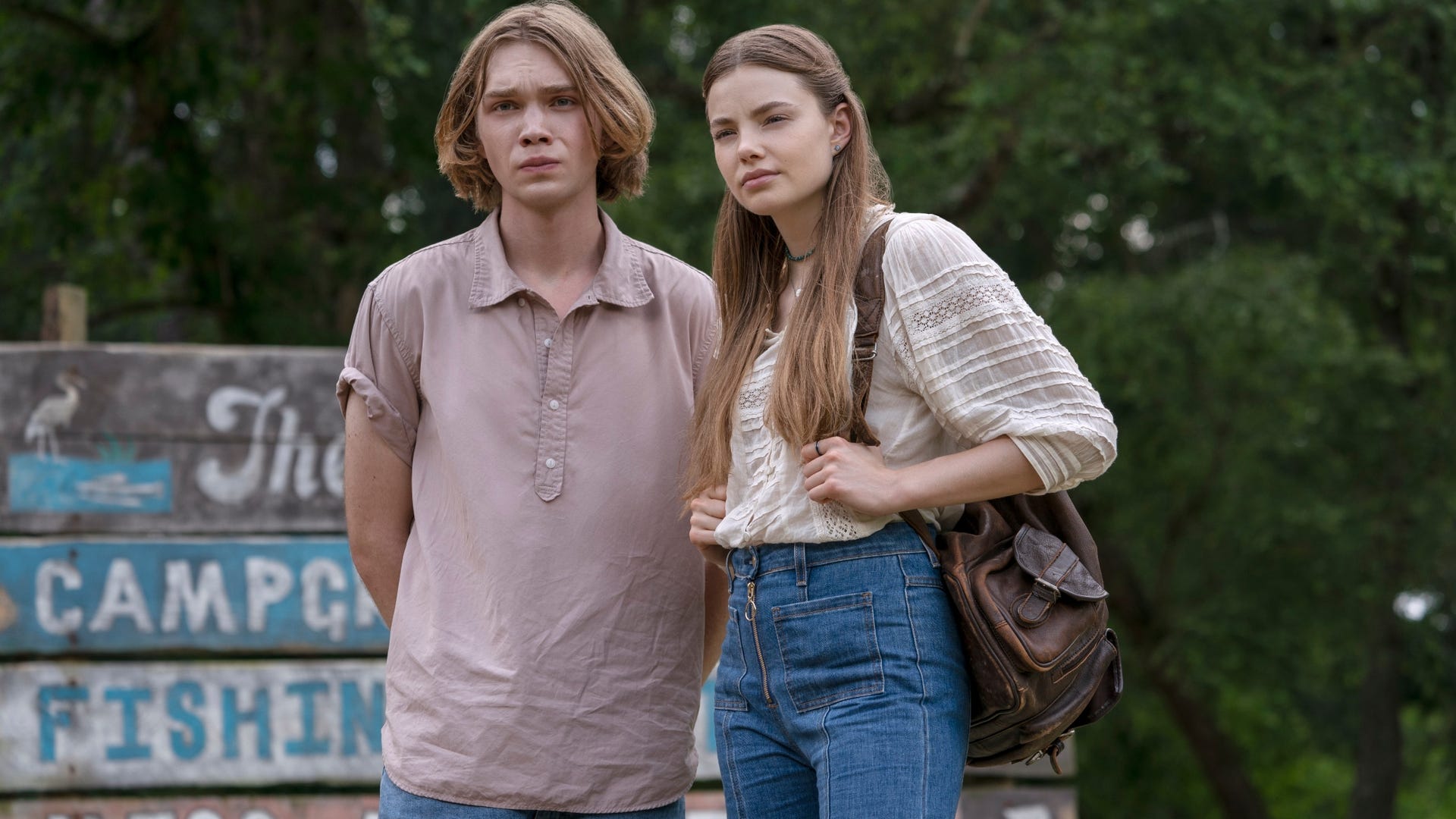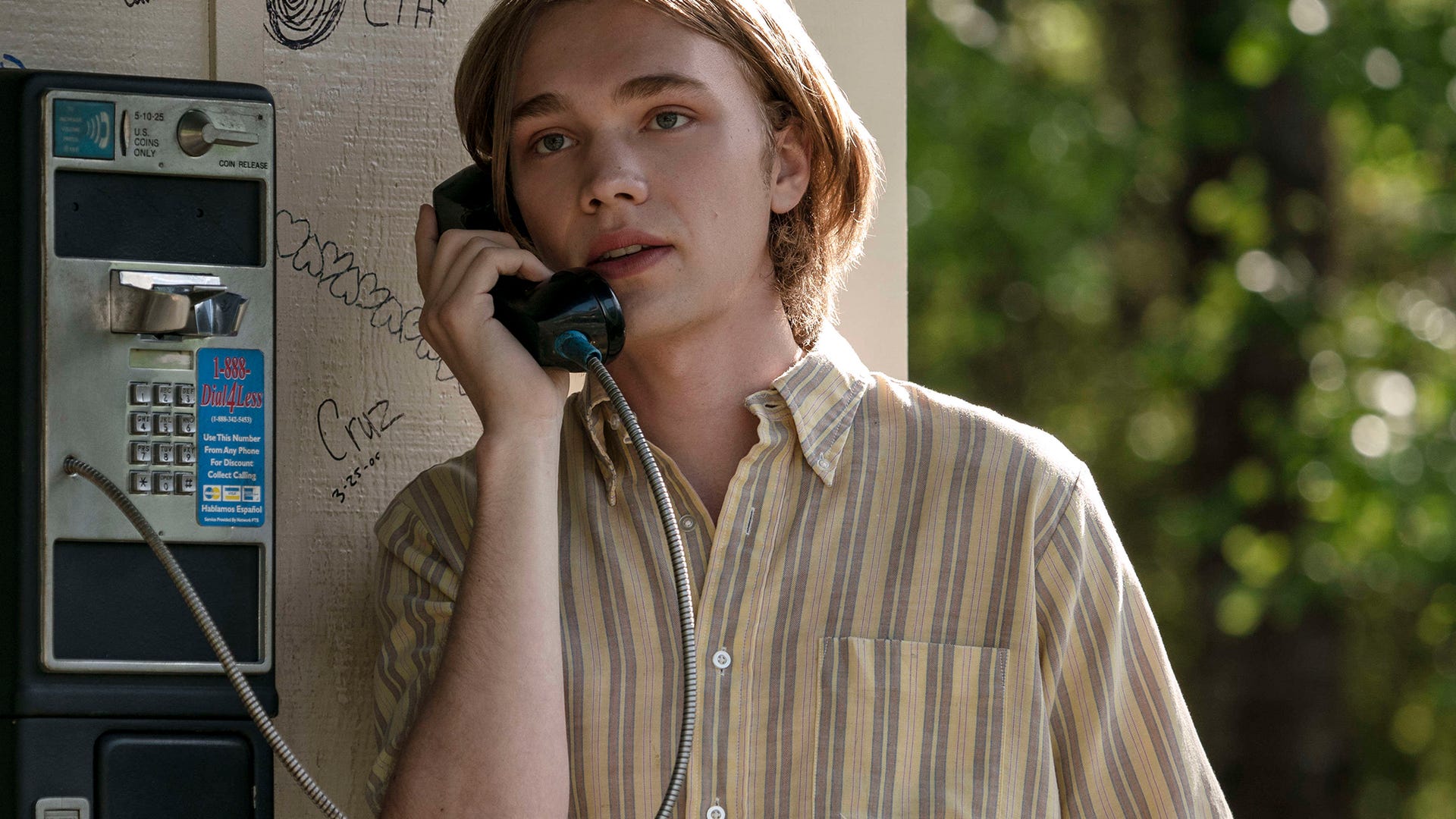Join or Sign In
Sign in to customize your TV listings
By joining TV Guide, you agree to our Terms of Use and acknowledge the data practices in our Privacy Policy.
Looking for Alaska Bosses Reveal Why They Kept the Central Death a Mystery
Plus: Denny Love inspired one of the show's most tear-jerking scenes!
Bringing John Green's beloved debut novel Looking for Alaska to the small screen was no small task for Josh Schwartz and Stephanie Savage, who adapted the book into an eight-episode miniseries for Hulu. It was a 15-year process, but the result was a beautiful rendering of a heartbreaking story that reminds readers and viewers to hold on to the ones who are close to them.
One of the most complicated aspects of Looking for Alaska is the death of the eponymous character. Alaska Young (Kristine Froseth) dies following a horrible car accident that no one except for a highway patrol officer was present to see. Her death is shrouded in a mystery that is unbearable for the friends Alaska left behind at Culver Creek Prep -- the boarding school they all attended. The enigmatic nature of Alaska's death -- whether she crashed her car on purpose or it truly was an accident -- is a key feature of the book and a centerpiece of the series.
Discover your new favorite show: Watch This Now!
TV Guide spoke with Schwartz and Savage in a joint interview about keeping Alaska's death a mystery, how they turned iconic lines from the book into actionable scenes, and how one of Looking for Alaska's actors inspired one of the most heartbreaking scenes that isn't in Green's novel.

Charlie Plummer and Kristine Froseth, Looking for Alaska
Alfonso BrescianiThe first scenes of the series are the car accident, and it turns out that is the most we see of the car accident through all eight episodes. What went into the decision to hide so much of what actually could have happened to Alaska in that accident?
Josh Schwartz: Part of what the story is, what John's book is about, is the feeling of the loss of control after someone you love has died and all you want are answers... If you could somehow change what happened, or take back some control of the situation, and you really can't. There are some things for which there are no answers to, and what happened exactly in that accident is something that, regardless of what the answer could be, did not change anything. So that's what informed the decision.
Stephanie Savage: We just felt like as writers and as people telling a visual story -- so much of the part of John's book is not knowing what happened -- that we didn't feel comfortable taking a stand on what we thought did happen and filming that. That's not what the story is about, and we couldn't come to any consensus, anyways, about what we thought that was.
You spent two full episodes in the "after" part of this story. How did you guys decide how much real estate to give that section of the book, and why did two episodes feel appropriate?
Schwartz: In the conversation that we had with John, we knew that we wanted this story, while it was going to be emotional and devastating and heartbreaking in places, we didn't want that to be the bulk of the story. It also is a celebration of life and first friendship, first love, and also first loss. So it was really about trying to calibrate that and make sure that we gave ourselves enough episodes in the after portion to delve into that part of the story and the mystery, the hope for answers, the realization that answers aren't going to change anything. Then kind of making that turn towards how do we honor Alaska's memory.
We also wanted to take as much time as we could with Alaska. So, it was really about, what is the maximum amount of time that we can have Alaska alive and on-screen and still make sure that we are properly and thoroughly delving into the emotional fallout of what happens to her?
How Hulu's Looking For Alaska Brought John Green's Best Novel to Life
You did manage to keep the iconic hurricane line in the script, but you moved it from where it actually is in the book to the end when Miles is grieving. What inspired that decision?
Schwartz: Obviously there were certain lines that we knew we wanted to have in the show that were iconic in the book. Some of them are interior, Miles' thoughts, that we had to figure out how to externalize, and the hurricane line was one that we knew we wanted to have in there. It felt like Miles grappling with Alaska's loss and what she meant to him, and how she made him feel, comparatively, it just felt like that was the right moment and the right way to externalize that thought.
How did you go about picking the music for this series? You're as famous for your soundtracks as you are for the teen dramas that you have created over the years.
Schwartz: It's a conservation with me and Steph, and Alex Patsavas, our music supervisor. We have fantastic editors who are music savvy. A lot of music was written into the script. In 2005, when I first wrote the feature version of this story, there were songs that were written in it. Because back then it was contemporary, so it was writing music in that was contemporary music that felt appropriate. When we set the show in 2005, a bunch of those songs were appropriate all over again this time as a period piece. So certain songs, like opening with Jose Gonzalez's "Crosses," [have] always been in the script from from the beginning.
Savage: Then we had some contemporary covers done of period songs, and we used primarily female vocalists, which not only changed the feeling of the emotion of the song, but also, in some cases, the intention, or who who they feel like they're reflecting. So for example, with the Death Cab For Cutie ["I Will Follow You into the Dark"] cover, aligning that song much more with the Alaska point of view, giving us a window into her emotions at that moment.
The First Looking for Alaska Trailer Will Break Your Heart
Where do you hope the conversation starts after people have completed the series?
Schwartz: Similar to the themes that are in the book: that life is fragile, people are fragile, look out for your friends. Sometimes the people we love most are going through something and you may not see that, or you may have an idea of what you think that person is, or what that person is going through, and being able to see who they really are. I think it's about holding onto your friends. Ultimately, we hope this show makes people feel less alone.
Savage: Yeah, I was going to add that, just the feeling of being connected to other people and not feeling alone in your own experience, to know that whatever you're going through, you're not the only one who's going through that. If you reach out, you'll find other people who will be there for you.
It was clear from the Instagram posts throughout the filming of this series that this cast and crew became very close. You guys had a very special experience making it. Was there ever a point where maybe even part of you considered, "Oh, maybe we could do, like, Miles goes to college" just to keep everybody together?
Savage: No.
Schwartz: That was another conversation we had with John. Obviously, it was very nice that the studio and network were really pleased with what we were making, and there were conversations about could we extend it? When we have a cast this wonderful and special, it's very hard just to walk away, but our decision creatively was, "Let's tell this story, tell it the best that we can, and then walk away." That's why the last episode ends with the end.

Charlie Plummer, Looking for Alaska
Alfonso Bresciani, HuluBecause of the extended format, there's some new stuff in the series that isn't in the book. What of that was your favorite?
Savage: One of the things that I had a lot of fun writing with Ashley Wigfield was in Episode 3, when Alaska goes to college with Jake. It's just a couple lines in the book, which mentions from Miles' point of view that Alaska went back to Jake's college and came back in the morning. We wanted to unpack that and imagine what it would be like for Alaska to be at a university where everybody there has read a lot of books, and everybody's very smart. She's reframed as something of the younger high school girl and what that would feel like for her to be out of her element in that way. We were really pleased with the story that we came up with, and John liked it a lot, and I think the actors did a great job. Kristine, especially, got to show some colors that we hadn't seen yet at that point in the series, and it was really inspiring.
Schwartz: For me, we were on Episode 6 and Denny Love, who plays [the] Colonel, came up to me and was like, "Why don't I get a scene with Ron Cephas Jones, who plays Dr. Hyde?" He's like, "Charlie gets all these great scenes with Ron. I want a great scene with Dr. Hyde." And I [said], "That's a really good point. Great thought," and then went off and tried to think about what that scene could be, and then came back to Denny and said, "OK, there's going to be a scene with you and Dr. Hyde, but selfishly, I'm going to put it in Episode 8 so I get to direct it and have you two in the scene together."
It was the scene, obviously, where Hyde comes on Christmas Eve, to be there for the Colonel. The making of that scene was really special. It was one of my favorite moments in making the show, just watching Ron, who's just such a wonderful, generous actor, be there for Denny in the same way that Dr. Hyde was there for the Colonel. The making of the scene and the scene itself, I'm just really proud of, and it was an opportunity to see two characters who don't get a chance to really connect in the book, connect on-screen. So thank you to Denny for inspiring them.
Here's Your First Look at Looking for Alaska's Culver Creek Prep
Also, I will say, the first day we shot at the liquor store was with Gus, our cashier. He was so good and so unique that I turned to Steph and I was like, "What if the stripper at the end of the show is Gus?" It was a different character in the book. It's someone who they don't really know. And Jared, who plays Gus, he ended up just delivering more than we ever could have hoped for in that final prank.
Are there any other John Green books that you guys think you would like to take a stab at?
Schwartz: All I can say is we would just love to work with John again. This has been a really joyful collaboration for us. I know he's really been pleased with the process and the show. And so, any opportunity we have to work with John again, we would jump at.
Looking for Alaska is now streaming on Hulu.
